Early Childhood Studies: UNCRC and Practitioner Roles
VerifiedAdded on 2021/02/22
|8
|2452
|101
Report
AI Summary
This report comprises blog journals focusing on early childhood education, specifically addressing the United Nations Convention on the Rights of the Child (UNCRC) and the roles of practitioners in supporting children's care, education, health, and welfare. The journals delve into how the UNCRC is embedded within curriculum frameworks globally and locally, emphasizing articles related to non-discrimination, the best interests of the child, survival and development, and the right to education. The report also examines the crucial roles of various practitioners, including nurses, doctors, and teachers, in ensuring children's well-being and development, highlighting their responsibilities and duties. Furthermore, the journals identify and discuss the challenges and barriers faced by practitioners, such as resource limitations, infectious diseases, language differences, and socio-cultural norms, which can impede effective support for children's health and welfare. The conclusion reiterates the importance of the UNCRC and the need for practitioners to overcome these challenges to provide comprehensive care and education to children, ensuring their rights are upheld.
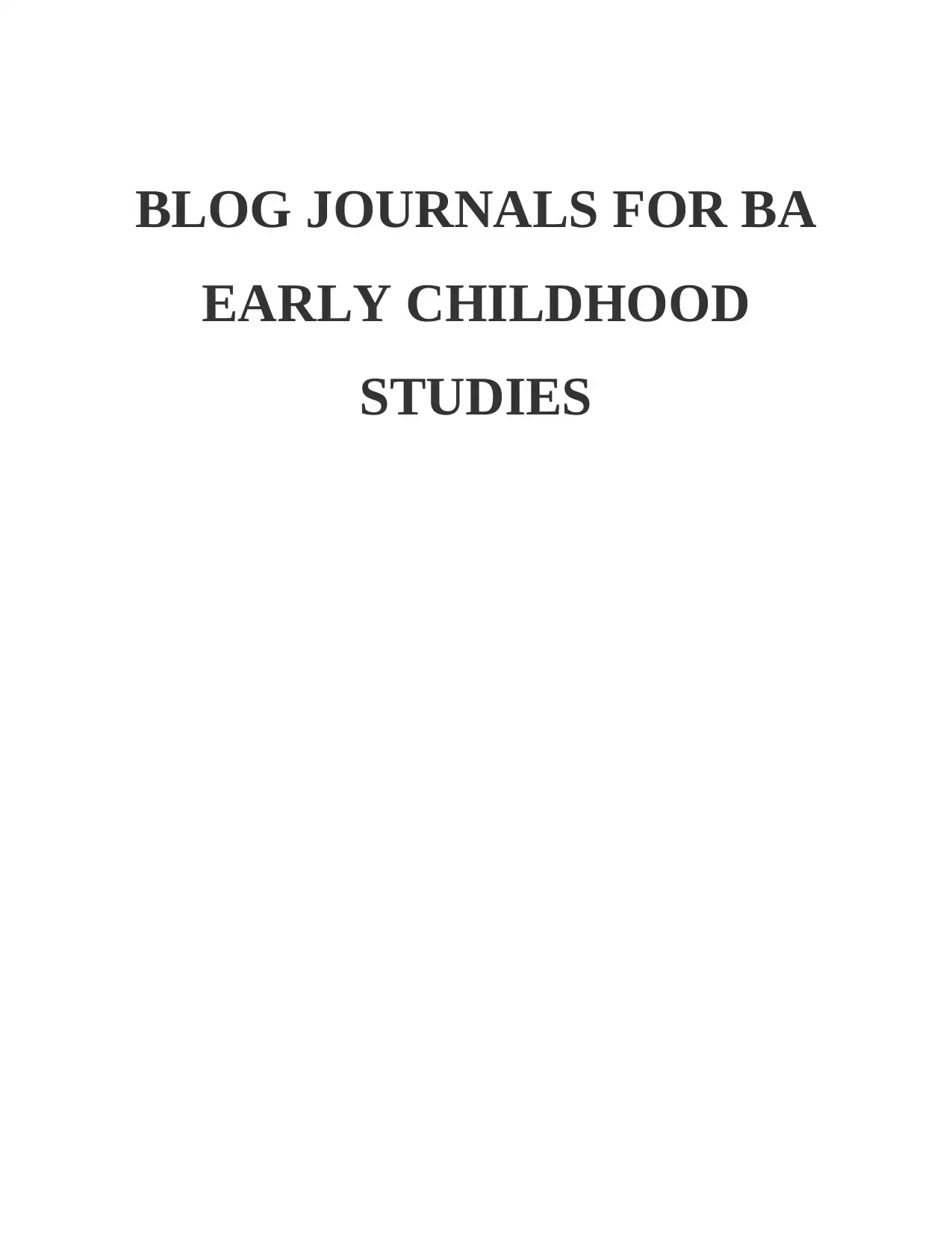
BLOG JOURNALS FOR BA
EARLY CHILDHOOD
STUDIES
EARLY CHILDHOOD
STUDIES
Paraphrase This Document
Need a fresh take? Get an instant paraphrase of this document with our AI Paraphraser
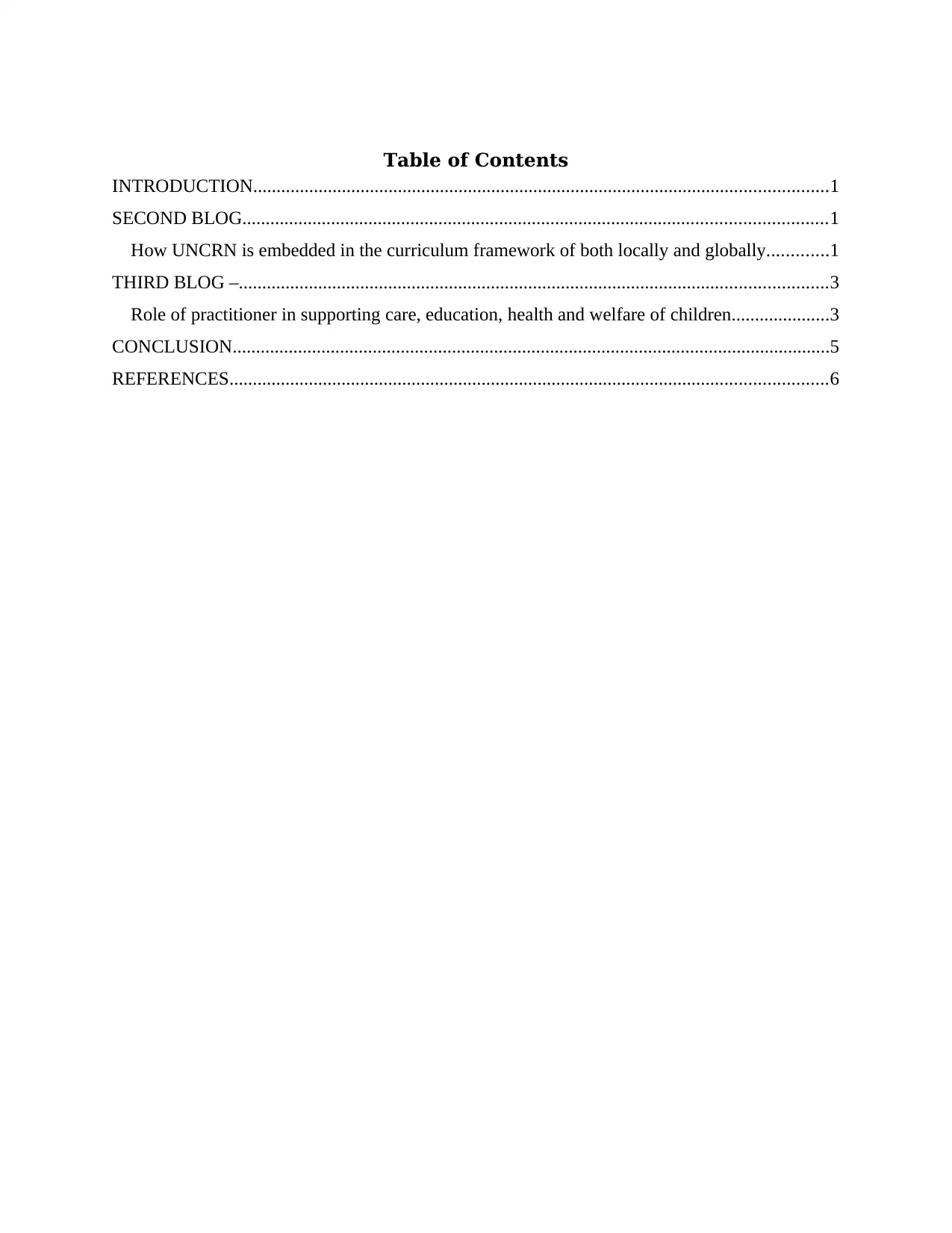
Table of Contents
INTRODUCTION...........................................................................................................................1
SECOND BLOG.............................................................................................................................1
How UNCRN is embedded in the curriculum framework of both locally and globally.............1
THIRD BLOG –..............................................................................................................................3
Role of practitioner in supporting care, education, health and welfare of children.....................3
CONCLUSION................................................................................................................................5
REFERENCES................................................................................................................................6
INTRODUCTION...........................................................................................................................1
SECOND BLOG.............................................................................................................................1
How UNCRN is embedded in the curriculum framework of both locally and globally.............1
THIRD BLOG –..............................................................................................................................3
Role of practitioner in supporting care, education, health and welfare of children.....................3
CONCLUSION................................................................................................................................5
REFERENCES................................................................................................................................6
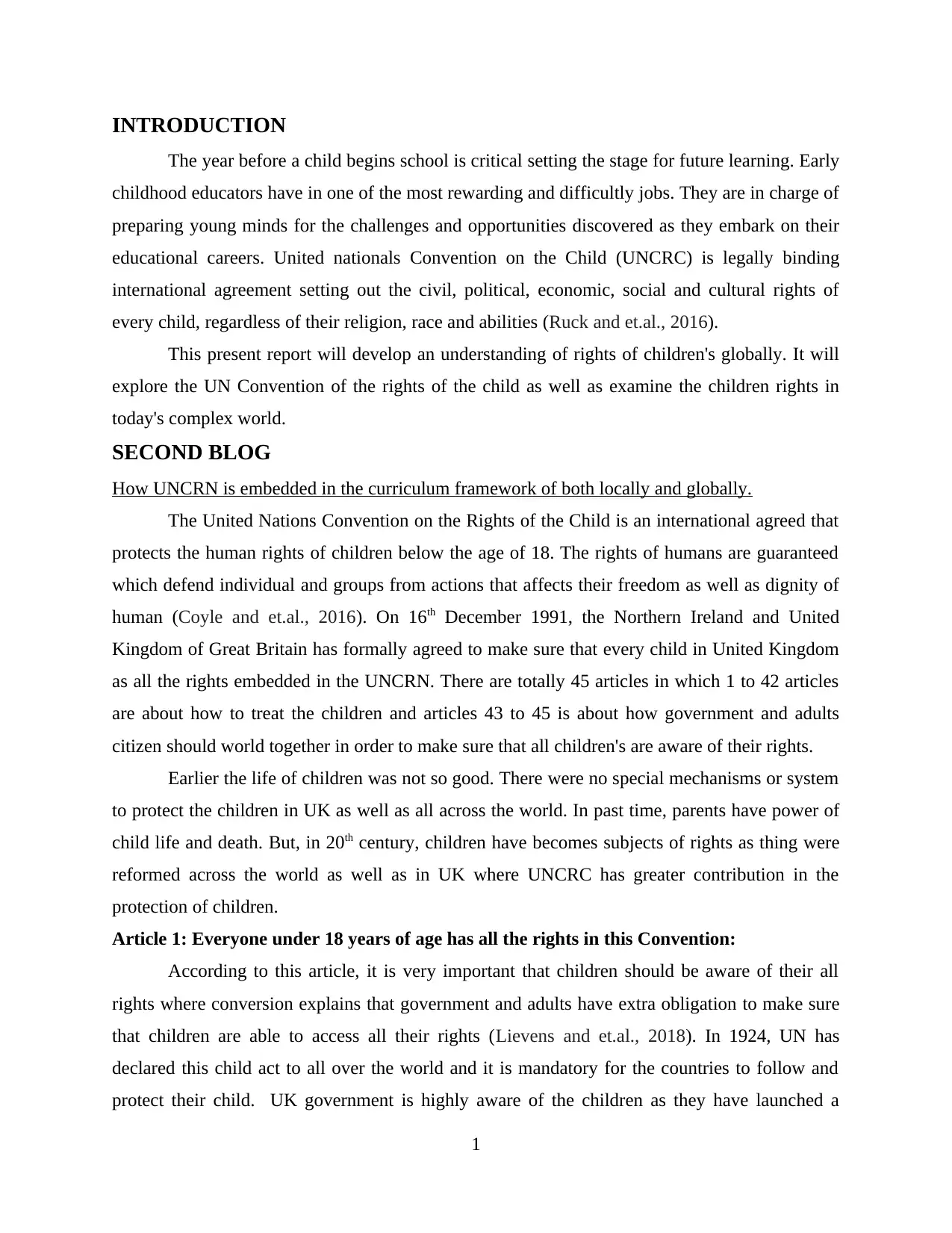
INTRODUCTION
The year before a child begins school is critical setting the stage for future learning. Early
childhood educators have in one of the most rewarding and difficultly jobs. They are in charge of
preparing young minds for the challenges and opportunities discovered as they embark on their
educational careers. United nationals Convention on the Child (UNCRC) is legally binding
international agreement setting out the civil, political, economic, social and cultural rights of
every child, regardless of their religion, race and abilities (Ruck and et.al., 2016).
This present report will develop an understanding of rights of children's globally. It will
explore the UN Convention of the rights of the child as well as examine the children rights in
today's complex world.
SECOND BLOG
How UNCRN is embedded in the curriculum framework of both locally and globally.
The United Nations Convention on the Rights of the Child is an international agreed that
protects the human rights of children below the age of 18. The rights of humans are guaranteed
which defend individual and groups from actions that affects their freedom as well as dignity of
human (Coyle and et.al., 2016). On 16th December 1991, the Northern Ireland and United
Kingdom of Great Britain has formally agreed to make sure that every child in United Kingdom
as all the rights embedded in the UNCRN. There are totally 45 articles in which 1 to 42 articles
are about how to treat the children and articles 43 to 45 is about how government and adults
citizen should world together in order to make sure that all children's are aware of their rights.
Earlier the life of children was not so good. There were no special mechanisms or system
to protect the children in UK as well as all across the world. In past time, parents have power of
child life and death. But, in 20th century, children have becomes subjects of rights as thing were
reformed across the world as well as in UK where UNCRC has greater contribution in the
protection of children.
Article 1: Everyone under 18 years of age has all the rights in this Convention:
According to this article, it is very important that children should be aware of their all
rights where conversion explains that government and adults have extra obligation to make sure
that children are able to access all their rights (Lievens and et.al., 2018). In 1924, UN has
declared this child act to all over the world and it is mandatory for the countries to follow and
protect their child. UK government is highly aware of the children as they have launched a
1
The year before a child begins school is critical setting the stage for future learning. Early
childhood educators have in one of the most rewarding and difficultly jobs. They are in charge of
preparing young minds for the challenges and opportunities discovered as they embark on their
educational careers. United nationals Convention on the Child (UNCRC) is legally binding
international agreement setting out the civil, political, economic, social and cultural rights of
every child, regardless of their religion, race and abilities (Ruck and et.al., 2016).
This present report will develop an understanding of rights of children's globally. It will
explore the UN Convention of the rights of the child as well as examine the children rights in
today's complex world.
SECOND BLOG
How UNCRN is embedded in the curriculum framework of both locally and globally.
The United Nations Convention on the Rights of the Child is an international agreed that
protects the human rights of children below the age of 18. The rights of humans are guaranteed
which defend individual and groups from actions that affects their freedom as well as dignity of
human (Coyle and et.al., 2016). On 16th December 1991, the Northern Ireland and United
Kingdom of Great Britain has formally agreed to make sure that every child in United Kingdom
as all the rights embedded in the UNCRN. There are totally 45 articles in which 1 to 42 articles
are about how to treat the children and articles 43 to 45 is about how government and adults
citizen should world together in order to make sure that all children's are aware of their rights.
Earlier the life of children was not so good. There were no special mechanisms or system
to protect the children in UK as well as all across the world. In past time, parents have power of
child life and death. But, in 20th century, children have becomes subjects of rights as thing were
reformed across the world as well as in UK where UNCRC has greater contribution in the
protection of children.
Article 1: Everyone under 18 years of age has all the rights in this Convention:
According to this article, it is very important that children should be aware of their all
rights where conversion explains that government and adults have extra obligation to make sure
that children are able to access all their rights (Lievens and et.al., 2018). In 1924, UN has
declared this child act to all over the world and it is mandatory for the countries to follow and
protect their child. UK government is highly aware of the children as they have launched a
1
⊘ This is a preview!⊘
Do you want full access?
Subscribe today to unlock all pages.

Trusted by 1+ million students worldwide
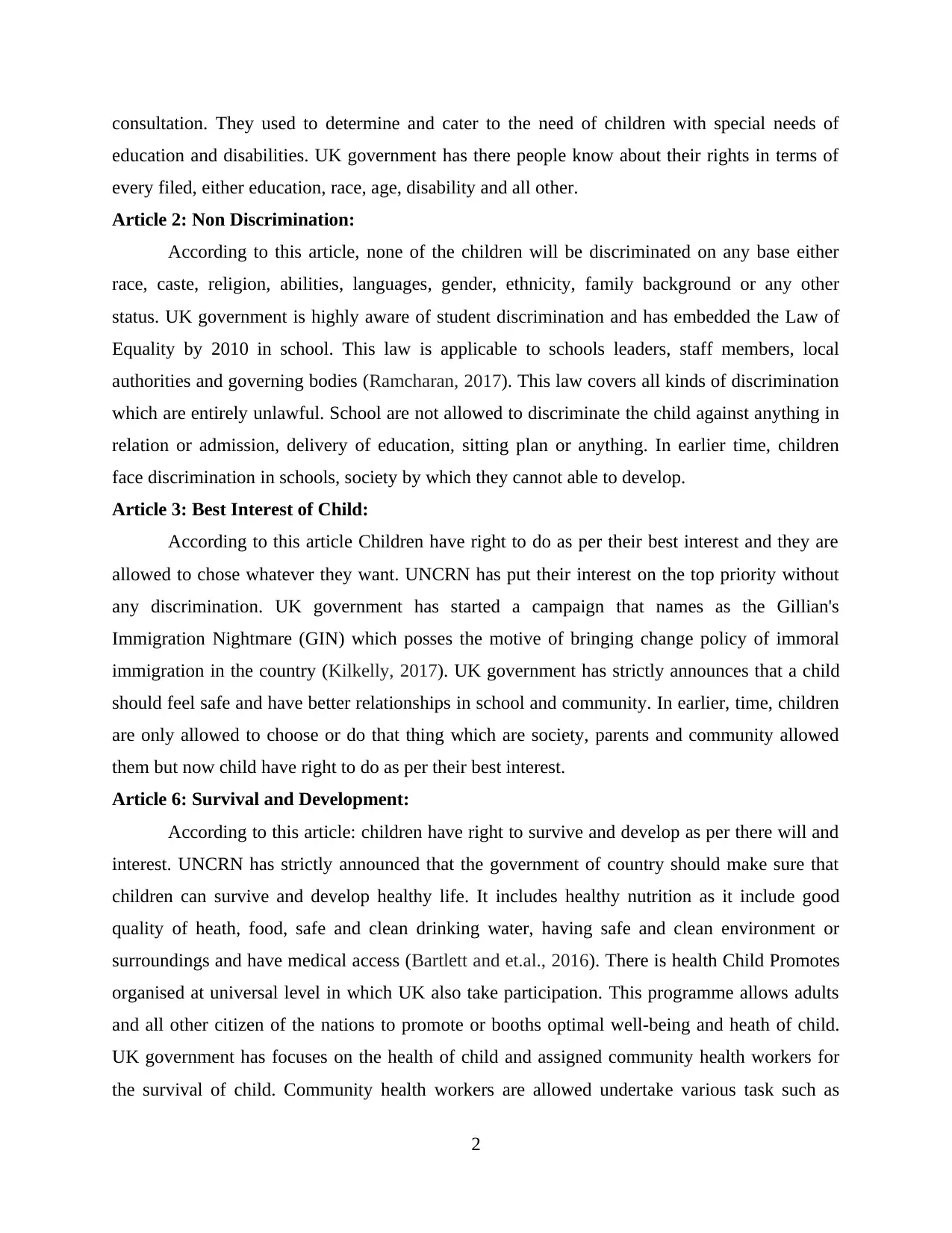
consultation. They used to determine and cater to the need of children with special needs of
education and disabilities. UK government has there people know about their rights in terms of
every filed, either education, race, age, disability and all other.
Article 2: Non Discrimination:
According to this article, none of the children will be discriminated on any base either
race, caste, religion, abilities, languages, gender, ethnicity, family background or any other
status. UK government is highly aware of student discrimination and has embedded the Law of
Equality by 2010 in school. This law is applicable to schools leaders, staff members, local
authorities and governing bodies (Ramcharan, 2017). This law covers all kinds of discrimination
which are entirely unlawful. School are not allowed to discriminate the child against anything in
relation or admission, delivery of education, sitting plan or anything. In earlier time, children
face discrimination in schools, society by which they cannot able to develop.
Article 3: Best Interest of Child:
According to this article Children have right to do as per their best interest and they are
allowed to chose whatever they want. UNCRN has put their interest on the top priority without
any discrimination. UK government has started a campaign that names as the Gillian's
Immigration Nightmare (GIN) which posses the motive of bringing change policy of immoral
immigration in the country (Kilkelly, 2017). UK government has strictly announces that a child
should feel safe and have better relationships in school and community. In earlier, time, children
are only allowed to choose or do that thing which are society, parents and community allowed
them but now child have right to do as per their best interest.
Article 6: Survival and Development:
According to this article: children have right to survive and develop as per there will and
interest. UNCRN has strictly announced that the government of country should make sure that
children can survive and develop healthy life. It includes healthy nutrition as it include good
quality of heath, food, safe and clean drinking water, having safe and clean environment or
surroundings and have medical access (Bartlett and et.al., 2016). There is health Child Promotes
organised at universal level in which UK also take participation. This programme allows adults
and all other citizen of the nations to promote or booths optimal well-being and heath of child.
UK government has focuses on the health of child and assigned community health workers for
the survival of child. Community health workers are allowed undertake various task such as
2
education and disabilities. UK government has there people know about their rights in terms of
every filed, either education, race, age, disability and all other.
Article 2: Non Discrimination:
According to this article, none of the children will be discriminated on any base either
race, caste, religion, abilities, languages, gender, ethnicity, family background or any other
status. UK government is highly aware of student discrimination and has embedded the Law of
Equality by 2010 in school. This law is applicable to schools leaders, staff members, local
authorities and governing bodies (Ramcharan, 2017). This law covers all kinds of discrimination
which are entirely unlawful. School are not allowed to discriminate the child against anything in
relation or admission, delivery of education, sitting plan or anything. In earlier time, children
face discrimination in schools, society by which they cannot able to develop.
Article 3: Best Interest of Child:
According to this article Children have right to do as per their best interest and they are
allowed to chose whatever they want. UNCRN has put their interest on the top priority without
any discrimination. UK government has started a campaign that names as the Gillian's
Immigration Nightmare (GIN) which posses the motive of bringing change policy of immoral
immigration in the country (Kilkelly, 2017). UK government has strictly announces that a child
should feel safe and have better relationships in school and community. In earlier, time, children
are only allowed to choose or do that thing which are society, parents and community allowed
them but now child have right to do as per their best interest.
Article 6: Survival and Development:
According to this article: children have right to survive and develop as per there will and
interest. UNCRN has strictly announced that the government of country should make sure that
children can survive and develop healthy life. It includes healthy nutrition as it include good
quality of heath, food, safe and clean drinking water, having safe and clean environment or
surroundings and have medical access (Bartlett and et.al., 2016). There is health Child Promotes
organised at universal level in which UK also take participation. This programme allows adults
and all other citizen of the nations to promote or booths optimal well-being and heath of child.
UK government has focuses on the health of child and assigned community health workers for
the survival of child. Community health workers are allowed undertake various task such as
2
Paraphrase This Document
Need a fresh take? Get an instant paraphrase of this document with our AI Paraphraser
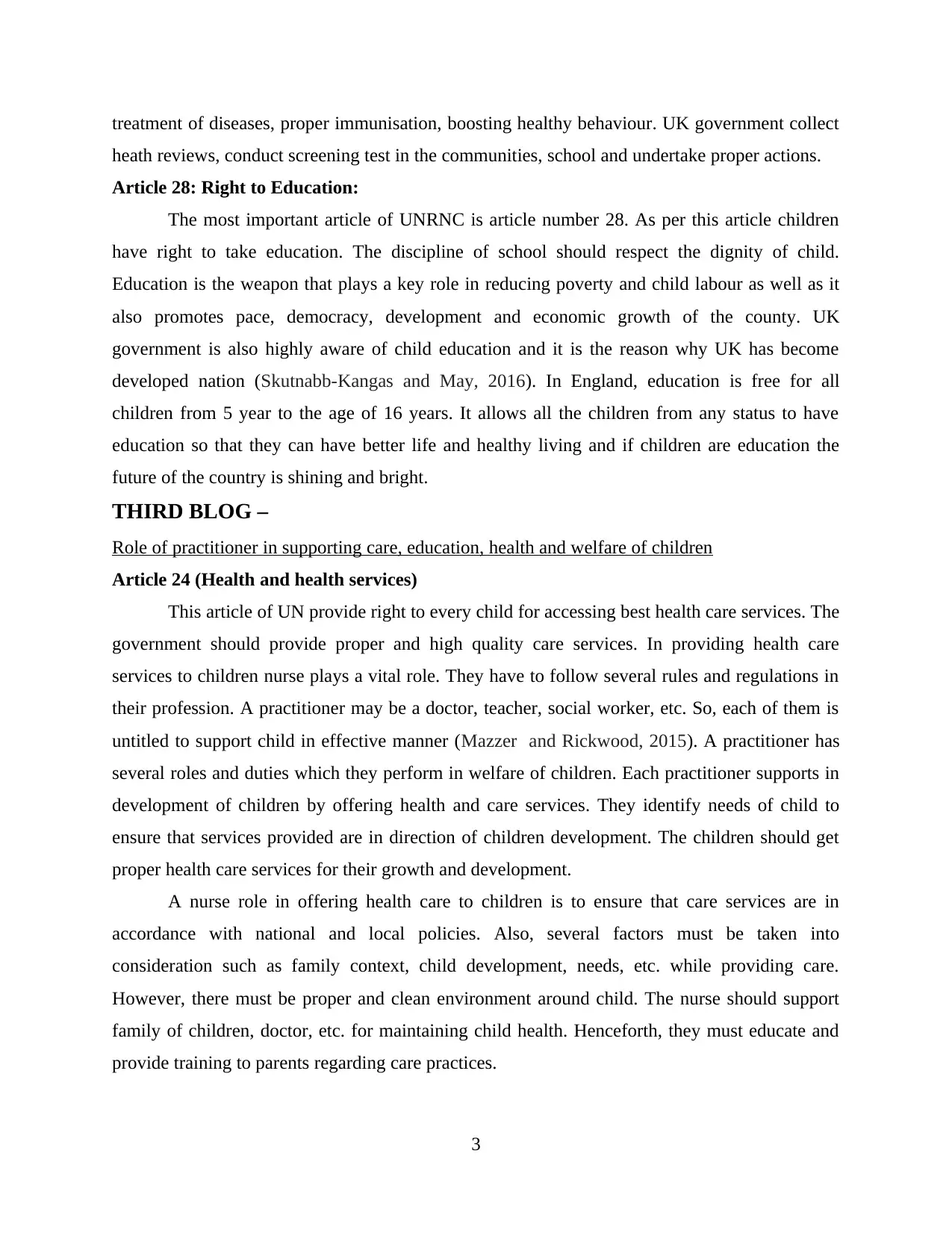
treatment of diseases, proper immunisation, boosting healthy behaviour. UK government collect
heath reviews, conduct screening test in the communities, school and undertake proper actions.
Article 28: Right to Education:
The most important article of UNRNC is article number 28. As per this article children
have right to take education. The discipline of school should respect the dignity of child.
Education is the weapon that plays a key role in reducing poverty and child labour as well as it
also promotes pace, democracy, development and economic growth of the county. UK
government is also highly aware of child education and it is the reason why UK has become
developed nation (Skutnabb-Kangas and May, 2016). In England, education is free for all
children from 5 year to the age of 16 years. It allows all the children from any status to have
education so that they can have better life and healthy living and if children are education the
future of the country is shining and bright.
THIRD BLOG –
Role of practitioner in supporting care, education, health and welfare of children
Article 24 (Health and health services)
This article of UN provide right to every child for accessing best health care services. The
government should provide proper and high quality care services. In providing health care
services to children nurse plays a vital role. They have to follow several rules and regulations in
their profession. A practitioner may be a doctor, teacher, social worker, etc. So, each of them is
untitled to support child in effective manner (Mazzer and Rickwood, 2015). A practitioner has
several roles and duties which they perform in welfare of children. Each practitioner supports in
development of children by offering health and care services. They identify needs of child to
ensure that services provided are in direction of children development. The children should get
proper health care services for their growth and development.
A nurse role in offering health care to children is to ensure that care services are in
accordance with national and local policies. Also, several factors must be taken into
consideration such as family context, child development, needs, etc. while providing care.
However, there must be proper and clean environment around child. The nurse should support
family of children, doctor, etc. for maintaining child health. Henceforth, they must educate and
provide training to parents regarding care practices.
3
heath reviews, conduct screening test in the communities, school and undertake proper actions.
Article 28: Right to Education:
The most important article of UNRNC is article number 28. As per this article children
have right to take education. The discipline of school should respect the dignity of child.
Education is the weapon that plays a key role in reducing poverty and child labour as well as it
also promotes pace, democracy, development and economic growth of the county. UK
government is also highly aware of child education and it is the reason why UK has become
developed nation (Skutnabb-Kangas and May, 2016). In England, education is free for all
children from 5 year to the age of 16 years. It allows all the children from any status to have
education so that they can have better life and healthy living and if children are education the
future of the country is shining and bright.
THIRD BLOG –
Role of practitioner in supporting care, education, health and welfare of children
Article 24 (Health and health services)
This article of UN provide right to every child for accessing best health care services. The
government should provide proper and high quality care services. In providing health care
services to children nurse plays a vital role. They have to follow several rules and regulations in
their profession. A practitioner may be a doctor, teacher, social worker, etc. So, each of them is
untitled to support child in effective manner (Mazzer and Rickwood, 2015). A practitioner has
several roles and duties which they perform in welfare of children. Each practitioner supports in
development of children by offering health and care services. They identify needs of child to
ensure that services provided are in direction of children development. The children should get
proper health care services for their growth and development.
A nurse role in offering health care to children is to ensure that care services are in
accordance with national and local policies. Also, several factors must be taken into
consideration such as family context, child development, needs, etc. while providing care.
However, there must be proper and clean environment around child. The nurse should support
family of children, doctor, etc. for maintaining child health. Henceforth, they must educate and
provide training to parents regarding care practices.
3
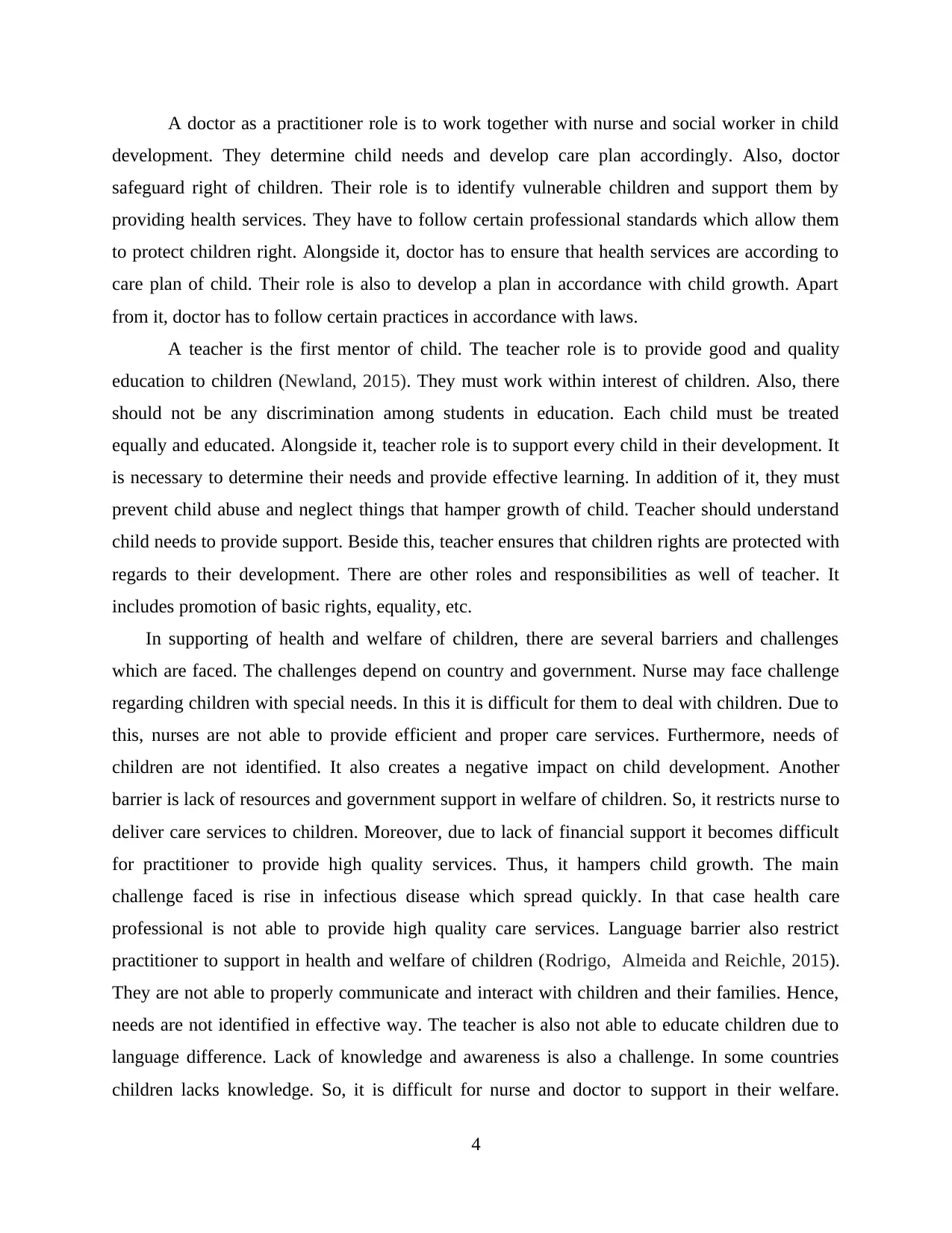
A doctor as a practitioner role is to work together with nurse and social worker in child
development. They determine child needs and develop care plan accordingly. Also, doctor
safeguard right of children. Their role is to identify vulnerable children and support them by
providing health services. They have to follow certain professional standards which allow them
to protect children right. Alongside it, doctor has to ensure that health services are according to
care plan of child. Their role is also to develop a plan in accordance with child growth. Apart
from it, doctor has to follow certain practices in accordance with laws.
A teacher is the first mentor of child. The teacher role is to provide good and quality
education to children (Newland, 2015). They must work within interest of children. Also, there
should not be any discrimination among students in education. Each child must be treated
equally and educated. Alongside it, teacher role is to support every child in their development. It
is necessary to determine their needs and provide effective learning. In addition of it, they must
prevent child abuse and neglect things that hamper growth of child. Teacher should understand
child needs to provide support. Beside this, teacher ensures that children rights are protected with
regards to their development. There are other roles and responsibilities as well of teacher. It
includes promotion of basic rights, equality, etc.
In supporting of health and welfare of children, there are several barriers and challenges
which are faced. The challenges depend on country and government. Nurse may face challenge
regarding children with special needs. In this it is difficult for them to deal with children. Due to
this, nurses are not able to provide efficient and proper care services. Furthermore, needs of
children are not identified. It also creates a negative impact on child development. Another
barrier is lack of resources and government support in welfare of children. So, it restricts nurse to
deliver care services to children. Moreover, due to lack of financial support it becomes difficult
for practitioner to provide high quality services. Thus, it hampers child growth. The main
challenge faced is rise in infectious disease which spread quickly. In that case health care
professional is not able to provide high quality care services. Language barrier also restrict
practitioner to support in health and welfare of children (Rodrigo, Almeida and Reichle, 2015).
They are not able to properly communicate and interact with children and their families. Hence,
needs are not identified in effective way. The teacher is also not able to educate children due to
language difference. Lack of knowledge and awareness is also a challenge. In some countries
children lacks knowledge. So, it is difficult for nurse and doctor to support in their welfare.
4
development. They determine child needs and develop care plan accordingly. Also, doctor
safeguard right of children. Their role is to identify vulnerable children and support them by
providing health services. They have to follow certain professional standards which allow them
to protect children right. Alongside it, doctor has to ensure that health services are according to
care plan of child. Their role is also to develop a plan in accordance with child growth. Apart
from it, doctor has to follow certain practices in accordance with laws.
A teacher is the first mentor of child. The teacher role is to provide good and quality
education to children (Newland, 2015). They must work within interest of children. Also, there
should not be any discrimination among students in education. Each child must be treated
equally and educated. Alongside it, teacher role is to support every child in their development. It
is necessary to determine their needs and provide effective learning. In addition of it, they must
prevent child abuse and neglect things that hamper growth of child. Teacher should understand
child needs to provide support. Beside this, teacher ensures that children rights are protected with
regards to their development. There are other roles and responsibilities as well of teacher. It
includes promotion of basic rights, equality, etc.
In supporting of health and welfare of children, there are several barriers and challenges
which are faced. The challenges depend on country and government. Nurse may face challenge
regarding children with special needs. In this it is difficult for them to deal with children. Due to
this, nurses are not able to provide efficient and proper care services. Furthermore, needs of
children are not identified. It also creates a negative impact on child development. Another
barrier is lack of resources and government support in welfare of children. So, it restricts nurse to
deliver care services to children. Moreover, due to lack of financial support it becomes difficult
for practitioner to provide high quality services. Thus, it hampers child growth. The main
challenge faced is rise in infectious disease which spread quickly. In that case health care
professional is not able to provide high quality care services. Language barrier also restrict
practitioner to support in health and welfare of children (Rodrigo, Almeida and Reichle, 2015).
They are not able to properly communicate and interact with children and their families. Hence,
needs are not identified in effective way. The teacher is also not able to educate children due to
language difference. Lack of knowledge and awareness is also a challenge. In some countries
children lacks knowledge. So, it is difficult for nurse and doctor to support in their welfare.
4
⊘ This is a preview!⊘
Do you want full access?
Subscribe today to unlock all pages.

Trusted by 1+ million students worldwide
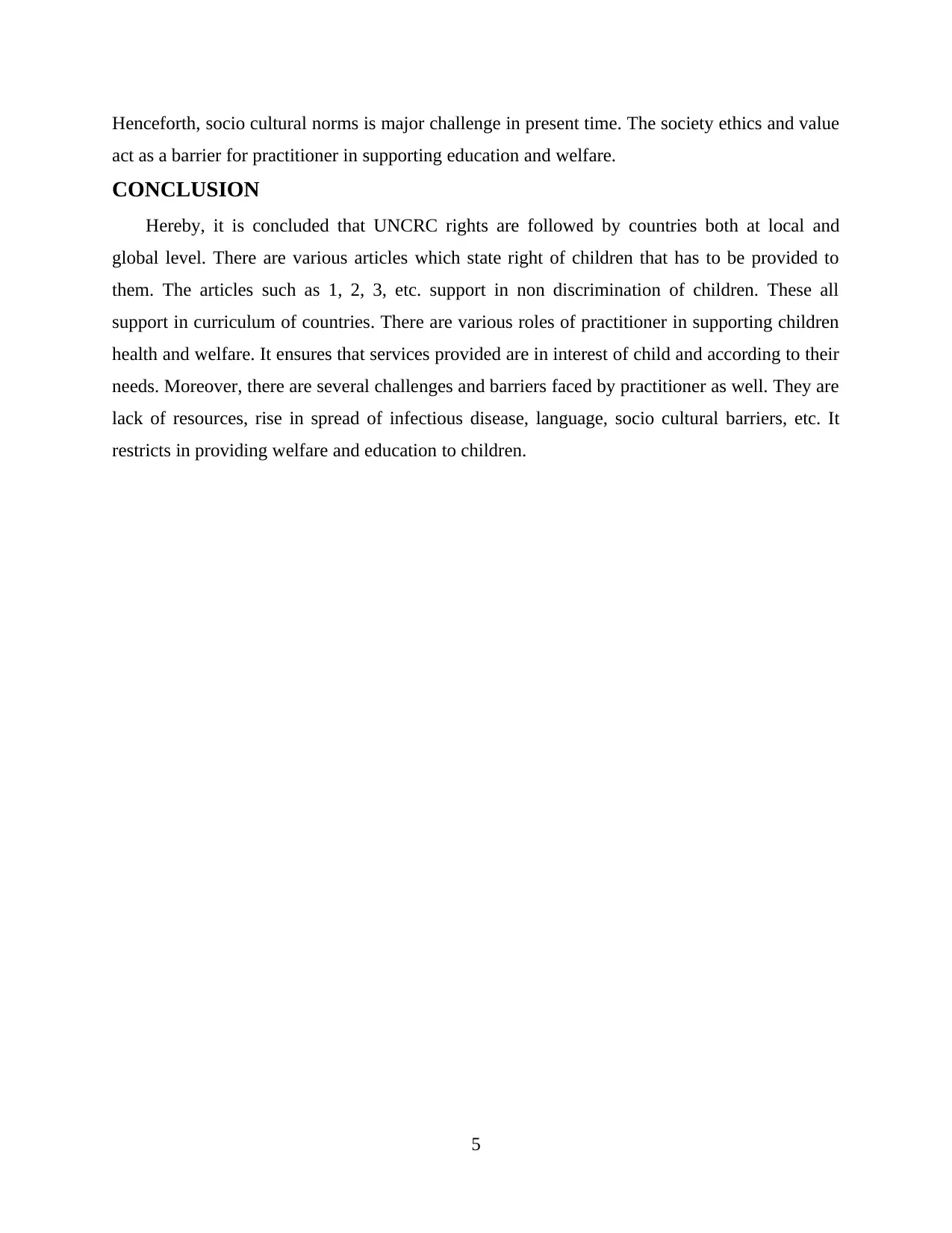
Henceforth, socio cultural norms is major challenge in present time. The society ethics and value
act as a barrier for practitioner in supporting education and welfare.
CONCLUSION
Hereby, it is concluded that UNCRC rights are followed by countries both at local and
global level. There are various articles which state right of children that has to be provided to
them. The articles such as 1, 2, 3, etc. support in non discrimination of children. These all
support in curriculum of countries. There are various roles of practitioner in supporting children
health and welfare. It ensures that services provided are in interest of child and according to their
needs. Moreover, there are several challenges and barriers faced by practitioner as well. They are
lack of resources, rise in spread of infectious disease, language, socio cultural barriers, etc. It
restricts in providing welfare and education to children.
5
act as a barrier for practitioner in supporting education and welfare.
CONCLUSION
Hereby, it is concluded that UNCRC rights are followed by countries both at local and
global level. There are various articles which state right of children that has to be provided to
them. The articles such as 1, 2, 3, etc. support in non discrimination of children. These all
support in curriculum of countries. There are various roles of practitioner in supporting children
health and welfare. It ensures that services provided are in interest of child and according to their
needs. Moreover, there are several challenges and barriers faced by practitioner as well. They are
lack of resources, rise in spread of infectious disease, language, socio cultural barriers, etc. It
restricts in providing welfare and education to children.
5
Paraphrase This Document
Need a fresh take? Get an instant paraphrase of this document with our AI Paraphraser
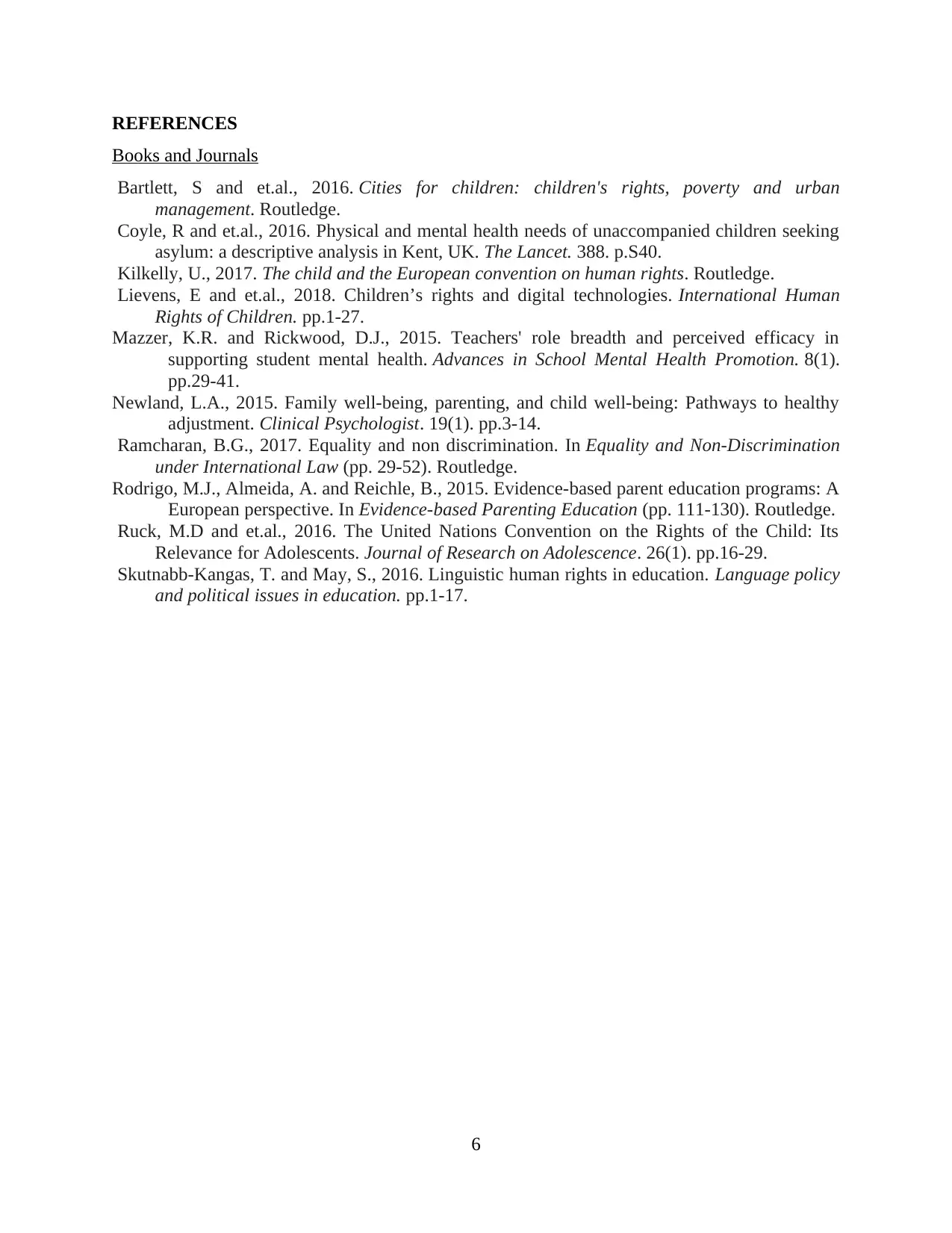
REFERENCES
Books and Journals
Bartlett, S and et.al., 2016. Cities for children: children's rights, poverty and urban
management. Routledge.
Coyle, R and et.al., 2016. Physical and mental health needs of unaccompanied children seeking
asylum: a descriptive analysis in Kent, UK. The Lancet. 388. p.S40.
Kilkelly, U., 2017. The child and the European convention on human rights. Routledge.
Lievens, E and et.al., 2018. Children’s rights and digital technologies. International Human
Rights of Children. pp.1-27.
Mazzer, K.R. and Rickwood, D.J., 2015. Teachers' role breadth and perceived efficacy in
supporting student mental health. Advances in School Mental Health Promotion. 8(1).
pp.29-41.
Newland, L.A., 2015. Family well‐being, parenting, and child well‐being: Pathways to healthy
adjustment. Clinical Psychologist. 19(1). pp.3-14.
Ramcharan, B.G., 2017. Equality and non discrimination. In Equality and Non-Discrimination
under International Law (pp. 29-52). Routledge.
Rodrigo, M.J., Almeida, A. and Reichle, B., 2015. Evidence-based parent education programs: A
European perspective. In Evidence-based Parenting Education (pp. 111-130). Routledge.
Ruck, M.D and et.al., 2016. The United Nations Convention on the Rights of the Child: Its
Relevance for Adolescents. Journal of Research on Adolescence. 26(1). pp.16-29.
Skutnabb-Kangas, T. and May, S., 2016. Linguistic human rights in education. Language policy
and political issues in education. pp.1-17.
6
Books and Journals
Bartlett, S and et.al., 2016. Cities for children: children's rights, poverty and urban
management. Routledge.
Coyle, R and et.al., 2016. Physical and mental health needs of unaccompanied children seeking
asylum: a descriptive analysis in Kent, UK. The Lancet. 388. p.S40.
Kilkelly, U., 2017. The child and the European convention on human rights. Routledge.
Lievens, E and et.al., 2018. Children’s rights and digital technologies. International Human
Rights of Children. pp.1-27.
Mazzer, K.R. and Rickwood, D.J., 2015. Teachers' role breadth and perceived efficacy in
supporting student mental health. Advances in School Mental Health Promotion. 8(1).
pp.29-41.
Newland, L.A., 2015. Family well‐being, parenting, and child well‐being: Pathways to healthy
adjustment. Clinical Psychologist. 19(1). pp.3-14.
Ramcharan, B.G., 2017. Equality and non discrimination. In Equality and Non-Discrimination
under International Law (pp. 29-52). Routledge.
Rodrigo, M.J., Almeida, A. and Reichle, B., 2015. Evidence-based parent education programs: A
European perspective. In Evidence-based Parenting Education (pp. 111-130). Routledge.
Ruck, M.D and et.al., 2016. The United Nations Convention on the Rights of the Child: Its
Relevance for Adolescents. Journal of Research on Adolescence. 26(1). pp.16-29.
Skutnabb-Kangas, T. and May, S., 2016. Linguistic human rights in education. Language policy
and political issues in education. pp.1-17.
6
1 out of 8
Related Documents
Your All-in-One AI-Powered Toolkit for Academic Success.
+13062052269
info@desklib.com
Available 24*7 on WhatsApp / Email
![[object Object]](/_next/static/media/star-bottom.7253800d.svg)
Unlock your academic potential
Copyright © 2020–2026 A2Z Services. All Rights Reserved. Developed and managed by ZUCOL.




